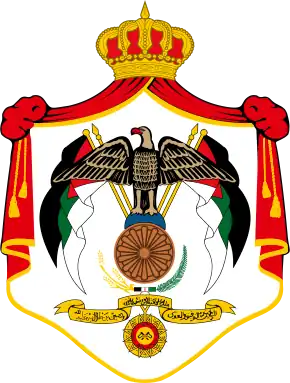| ||
|
| ||

 |
|---|
|
|
|
|
General elections were held in Transjordan on 2 April 1929, the first in the country's history.[1]
Background
Following the preparation of electoral laws and a draft constitution by the Jordanian authorities in 1923, the British government declared an intention to recognise the independence of the country and prepare a treaty.[1] However, the treaty was not signed until 20 February 1928.[1]
Electoral system
The 1928 basic law provided for a unicameral Legislative Council. The 16 elected members were joined by the six-member cabinet, which included the Prime Minister.[1] The term length was set at three years.[1]
Results
The sixteen elected members were:[1]
- Najeeb al-Shraideh
- Abdallah al-Kulayb
- Oqla Mohammad al-Nsuir
- Najeeb Abu al-Sha'ar
- Sa`id al-Mufti
- Ala'a al-Dien Touqan
- Shams al-Dien Sami
- Saeed al-Saleepi
- Mohammad al-Ensi
- Najeeb al-Ibrahim
- Ata Allah a-Shemat
- Refefan al-Majali
- Odeh al-Qsous
- Saleh al-Oran
- Hamad Bin Jazi
- Methqal al-Fayez
After being appointed Director of Antiquities, Ala'a al-Dien Touqan resigned from the council. In a by-election held on 14 November 1929, Nadmi Abd Al-Hadi was elected to replace him.[1]
Aftermath
Hassan Khalid Abu al-huda remained Prime Minister, and joined the Council along with the ministers Reda Tawfiq, Hussam al-Dien Jaar Allah, Aref al-Aref, Abd al-Rahman Ghareeb and Alin Karkbried.[1] On 17 October 1929 al-Huda formed a new government, which included Ibrahim Hashem, Tawfik Abu al-Huda, Ala'a al-Dien Touqan, Odeh al-Qsous and Sa`id al-Mufti.[1]
The council was dissolved on 9 January 1931 after rejecting the budget annex.[1] Early elections were held on 10 June.[1]